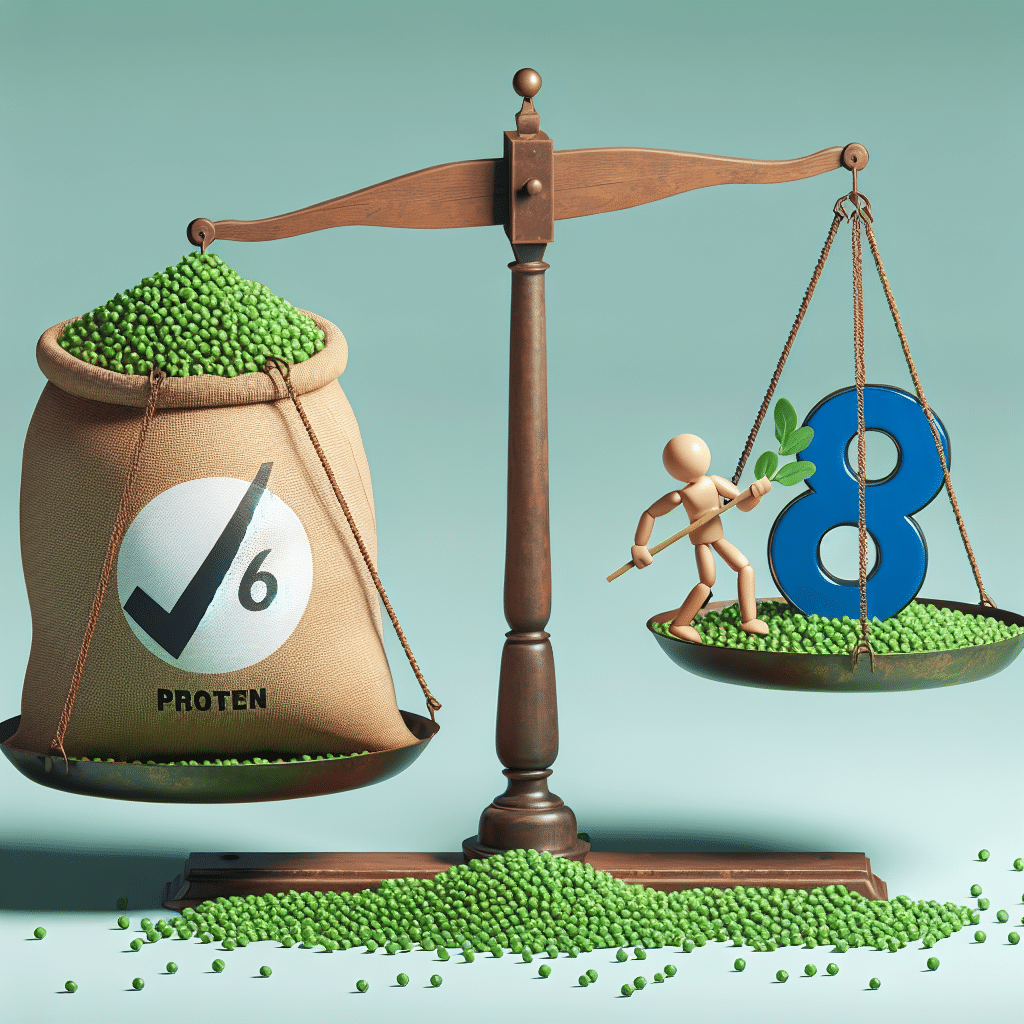Is Too Much Pea Protein Bad?
-
Table of Contents
- Pea Protein Intake: How Much is Too Much?
- Understanding Pea Protein
- The Benefits of Pea Protein
- Potential Risks of Excessive Pea Protein Consumption
- What Does the Research Say?
- Recommended Daily Intake of Protein
- Case Studies and Anecdotal Evidence
- How to Consume Pea Protein Safely
- Conclusion: Balancing Pea Protein Intake
- Discover ETprotein’s High-Quality Pea Protein Products
Pea Protein Intake: How Much is Too Much?

Pea protein has become a popular alternative to animal-based proteins, especially among vegetarians, vegans, and those with dietary restrictions. As a plant-based protein, it offers a range of health benefits and is often considered a more sustainable and ethical option. However, as with any nutrient, there is a potential for overconsumption. This article explores whether too much pea protein can be detrimental to health, backed by scientific research and expert opinions.
Understanding Pea Protein
Pea protein is derived from yellow split peas and is a high-quality protein that contains all nine essential amino acids. It is commonly used in protein powders, meat substitutes, and a variety of health food products. Its rise in popularity is due to its hypoallergenic properties and its status as a non-GMO and gluten-free source of protein.
The Benefits of Pea Protein
Before delving into the potential risks of overconsumption, it’s important to acknowledge the benefits of pea protein:
- Rich in iron and arginine, which are beneficial for heart health and blood flow.
- Highly digestible and typically well-tolerated, making it a good option for those with sensitive stomachs.
- May aid in muscle growth, weight management, and overall health.
Potential Risks of Excessive Pea Protein Consumption
While pea protein offers numerous health benefits, excessive intake may lead to potential risks:
- Impaired kidney function due to the high workload of processing large amounts of protein.
- Nutritional imbalances, as focusing too much on protein can lead to inadequate intake of other essential nutrients.
- Gastrointestinal issues such as bloating, gas, and an upset stomach, particularly in individuals with sensitive digestive systems.
What Does the Research Say?
Research on pea protein is still emerging, but current studies suggest that moderate consumption is safe for most people. However, there is a lack of long-term studies on the effects of high pea protein intake. It’s important to consider individual health conditions and dietary needs when determining the appropriate amount of pea protein.
Recommended Daily Intake of Protein
The Recommended Dietary Allowance (RDA) for protein is 0.8 grams per kilogram of body weight for the average adult. Athletes and those with higher protein needs may require more. It’s crucial to balance protein intake with other nutrients to maintain a well-rounded diet.
Case Studies and Anecdotal Evidence
While scientific studies are essential, anecdotal evidence from individuals and nutritionists can also provide insight into the effects of pea protein consumption. Some users report improved muscle recovery and satiety, while others experience digestive discomfort when consuming large amounts of pea protein.
How to Consume Pea Protein Safely
To enjoy the benefits of pea protein without overdoing it, consider the following tips:
- Integrate pea protein into a balanced diet that includes a variety of protein sources.
- Monitor your total daily protein intake to ensure it aligns with your individual needs and health goals.
- Listen to your body and adjust your pea protein consumption if you experience any adverse effects.
Conclusion: Balancing Pea Protein Intake
In conclusion, pea protein is a valuable addition to many diets, but like any nutrient, it should be consumed in moderation. Paying attention to your body’s signals and adhering to recommended dietary guidelines will help you reap the benefits of pea protein without experiencing negative side effects. As research continues to evolve, it’s important to stay informed and consult with healthcare professionals regarding your dietary choices.
Discover ETprotein’s High-Quality Pea Protein Products
If you’re looking to incorporate pea protein into your diet, ETprotein offers a range of high-quality protein products that cater to various dietary needs. Their pea protein is characterized by a neutral taste, non-GMO, and allergen-free attributes, ensuring you get the best in terms of both nutrition and flavor.
About ETprotein:
ETprotein, a reputable protein and L-(+)-Ergothioneine (EGT) Chinese factory manufacturer and supplier, is renowned for producing, stocking, exporting, and delivering the highest quality organic bulk vegan proteins and L-(+)-Ergothioneine. They include Organic rice protein, clear rice protein, pea protein, clear pea protein, watermelon seed protein, pumpkin seed protein, sunflower seed protein, mung bean protein, peanut protein, and L-(+)-Ergothioneine EGT Pharmaceutical grade, L-(+)-Ergothioneine EGT food grade, L-(+)-Ergothioneine EGT cosmetic grade, L-(+)-Ergothioneine EGT reference grade and L-(+)-Ergothioneine EGT standard. Their offerings, characterized by a neutral taste, non-GMO, allergen-free attributes, with L-(+)-Ergothioneine purity over 98%, 99%, cater to a diverse range of industries. They serve nutraceutical, pharmaceutical, cosmeceutical, veterinary, as well as food and beverage finished product distributors, traders, and manufacturers across Europe, USA, Canada, Australia, Thailand, Japan, Korea, Brazil, and Chile, among others.
ETprotein specialization includes exporting and delivering tailor-made protein powder and finished nutritional supplements. Their extensive product range covers sectors like Food and Beverage, Sports Nutrition, Weight Management, Dietary Supplements, Health and Wellness Products, and Infant Formula, ensuring comprehensive solutions to meet all your protein needs.
As a trusted company by leading global food and beverage brands and Fortune 500 companies, ETprotein reinforces China’s reputation in the global arena. For more information or to sample their products, please contact them and email sales(at)ETprotein.com today.












